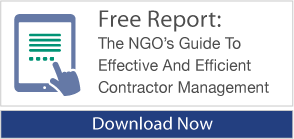 With so many moving parts and collaborators, your non-governmental organization (NGO) or non-profit organization (NPO) has to keep a lot of people happy. Staff, volunteers, donors, etc. – each group has a range of contracts, invoices, and authorizations associated with them. They share a vision with you, but if they can’t trust you everyone loses sight of the vision and the partnership loses its foundation.
With so many moving parts and collaborators, your non-governmental organization (NGO) or non-profit organization (NPO) has to keep a lot of people happy. Staff, volunteers, donors, etc. – each group has a range of contracts, invoices, and authorizations associated with them. They share a vision with you, but if they can’t trust you everyone loses sight of the vision and the partnership loses its foundation.
The best way to secure trust with the people who partner with you is to secure consistency. And the best way to secure consistency is through maintaining a system of automated business processes. More and more NGOs and NPOs have made this possible by adopting a document management system across their various departments.
International Fund Requests
You probably don't send more than a month’s worth of funds to country offices in order to control spending. Each month your country office must request funds by providing information about what they just spent and what they have coming up. 4 to 5 people typically review this request before the money is sent.
This process is time-sensitive and cannot simply wait in someone’s inbox or email. It must be processed immediately or the country office will run out of money to pay their suppliers and subcontractors. Not good.
Establishing an automated document workflow allows you to set up deadlines, so the process can be pushed forward if people have not completed their tasks on time. Users can also set up automated delegation of their work when they are going to be out of the office.
Purchase Agreements
NGOs/NPOs purchase supplies, services, and consulting to fulfill their mission. These all need to have agreements/contracts in place. The faster that you can effectively review and approve these agreements while enforcing your compliance, the faster you can deliver. This allows you to take on more projects.
Accounts Payable Processing
Invoice payments are also very important. Suppliers and subcontractors need to be paid for what they have delivered. If you’re late, it may interrupt your service delivery, which will impact your ability to meet project goals. If you miss goals, it makes it more difficult to keep your donors happy.
Compliance Functionality
Chances are your nonprofit receives the bulk of its funding from government agencies or private foundations. There’s a lot of stress in maintaining that consistent stream of funds. Without it, your mission loses its momentum. Record retention policies vary by company and change with time, and failure to produce a proper audit trail could permanently damage your credibility.
A system geared for compliance makes your organization secure and thus more legitimate, which inclines your current donors to keep funding your mission or funding their mission through you. In addition, prospective donors will know where their money is going, making them more confident in supporting your organization.
Access Control
When permissions are role-based, only authorized members have access to certain files. Access control is necessary for the different groups and programs that constitute non-profit organizations, ensuring that files meant for one sector of your organization will remain designated for only the necessary parties within that sector.
Trust = Investment
However noble your cause is, the sad reality is that it’s a jungle out there for NPOs and NGOs, perhaps even more so than with for-profit institutions who have capital on their side. All you have is your ability to maximize your limited resources and your dedication to your mission. If your message resonates with others, you’ll attract interest, no doubt, but only if you run a tight ship will you attract investment.
DMS is only the beginning, but it is a necessary first step in setting your processes in motion and establishing partnerships with a strong foundation. If your partners know they can count on you, so will your cause, and everyone it sets out to help.

